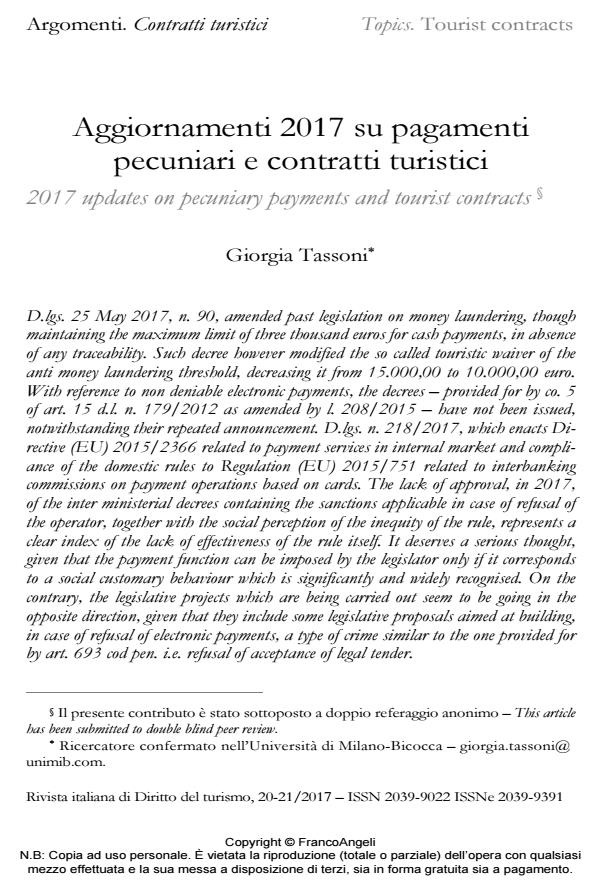2017 updates on pecuniary payments and tourist contracts
Journal title RIVISTA ITALIANA DI DIRITTO DEL TURISMO
Author/s Giorgia Tassoni
Publishing Year 2018 Issue 2017/20-21
Language Italian Pages 17 P. 207-223 File size 159 KB
DOI 10.3280/DT2017-020002
DOI is like a bar code for intellectual property: to have more infomation
click here
Below, you can see the article first page
If you want to buy this article in PDF format, you can do it, following the instructions to buy download credits

FrancoAngeli is member of Publishers International Linking Association, Inc (PILA), a not-for-profit association which run the CrossRef service enabling links to and from online scholarly content.
D.lgs. 25 May 2017, n. 90, amended past legislation on money laundering, though maintaining the maximum limit of three thousand euros for cash payments, in absence of any traceability. Such decree however modified the so called touristic waiver of the anti money laundering threshold, decreasing it from 15.000,00 to 10.000,00 euro. With reference to non deniable electronic payments, the decrees - provided for by co. 5 of art. 15 d.l. n. 179/2012 as amended by l. 208/2015 - have not been issued, notwithstanding their repeated announcement. D.lgs. n. 218/2017, which enacts Directive (EU) 2015/2366 related to payment services in internal market and compliance of the domestic rules to Regulation (EU) 2015/751 related to interbanking commissions on payment operations based on cards. The lack of approval, in 2017, of the inter ministerial decrees containing the sanctions applicable in case of refusal of the operator, together with the social perception of the inequity of the rule, represents a clear index of the lack of effectiveness of the rule itself. It deserves a serious thought, given that the payment function can be imposed by the legislator only if it corresponds to a social customary behaviour which is significantly and widely rec-ognised. On the contrary, the legislative projects which are being carried out seem to be going in the opposite direction, given that they include some legislative proposals aimed at building, in case of refusal of electronic payments, a type of crime similar to the one provided for by art. 693 cod pen. i.e. refusal of acceptance of legal tender.
Giorgia Tassoni, Aggiornamenti 2017 su pagamenti pecuniari e contratti turistici in "RIVISTA ITALIANA DI DIRITTO DEL TURISMO" 20-21/2017, pp 207-223, DOI: 10.3280/DT2017-020002